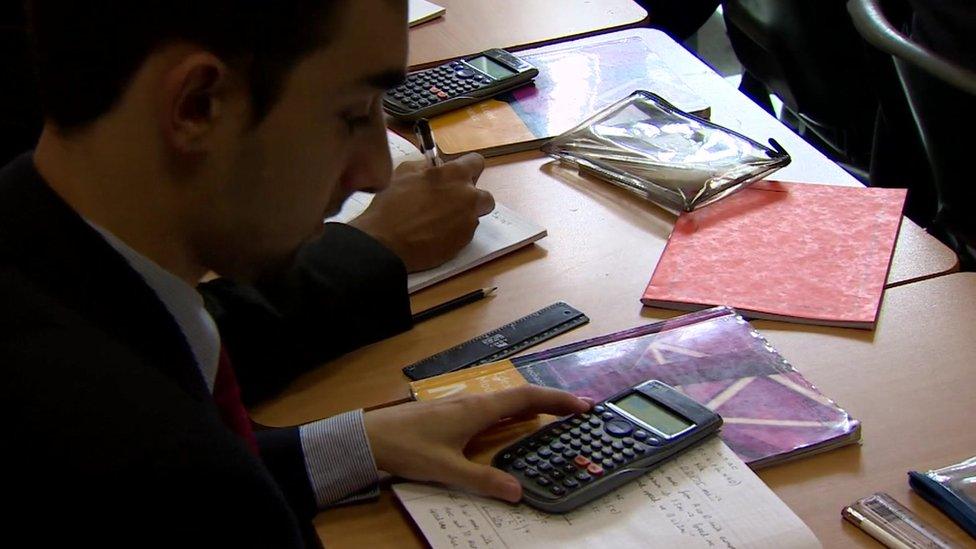Grammar schools and poverty: Check your area
- Published
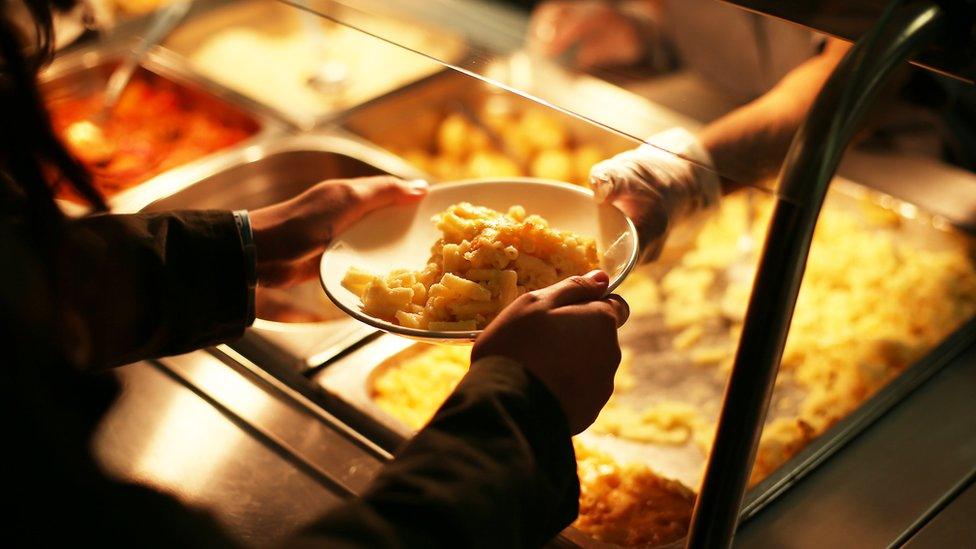
Some grammar schools prioritise pupils who are eligible for free school meals
Fewer than half of grammar schools make deliberate efforts to admit children from very low income backgrounds, the BBC has found.
An analysis of admission policies found that only 73 out of the 163 existing grammar schools in England gave priority to children eligible for free school meals.
Once widespread, grammar schools are now confined to just 36 of England's 152 local authorities, but Prime Minister Theresa May plans to change and expand the system.
New selective schools would have to show they were "genuinely reaching out across society" and taking children from a range of backgrounds, Mrs May said.
Admissions policies
Grammar schools are, by their nature, selective: children must sit a test to be considered for admission.
But while some schools select on ranked test scores alone, others use a range of criteria to decide which pupils to admit once they have passed the test.
Oversubscribed schools may prioritise particular postcodes, siblings of children already at the school, religious faiths and other criteria - including past or present eligibility for free school meals.
The BBC analysed the admissions policy of all 163 English state grammar schools for the school year starting September 2017, or if unchanged for the year 2016-17.
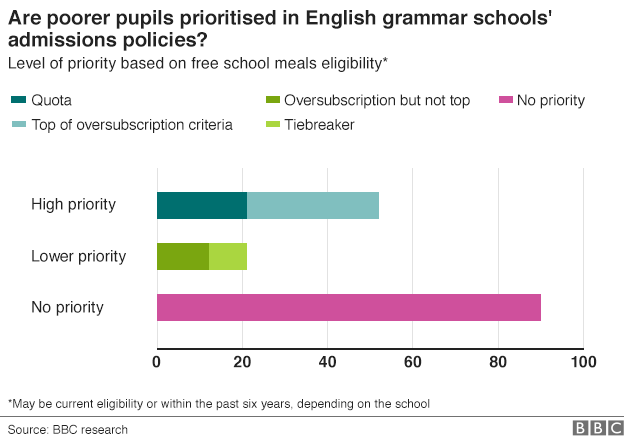
In 21 schools, a quota of children currently or previously eligible for free school meals are admitted separately from other applicants.
A further 31 schools put such children top of their oversubscription criteria: the method for deciding whom to admit if there are more eligible pupils than places.
Putting children from lower income families at the top of the oversubscription criteria can result in higher numbers than a simple quota.
The Skinners' School in Kent has a quota but only sets aside five places specifically for children entitled to free school meals.
Ninety schools give no priority for past or present free school meals eligibility, and 21 give a lower priority in their oversubscription criteria or use it as a potential tie-breaker for the last place in the school.
Northern Ireland's 66 grammar schools tend not to prioritise pupils on free school meals, but they are more socially inclusive anyway, with a higher proportion of pupils from poorer backgrounds.
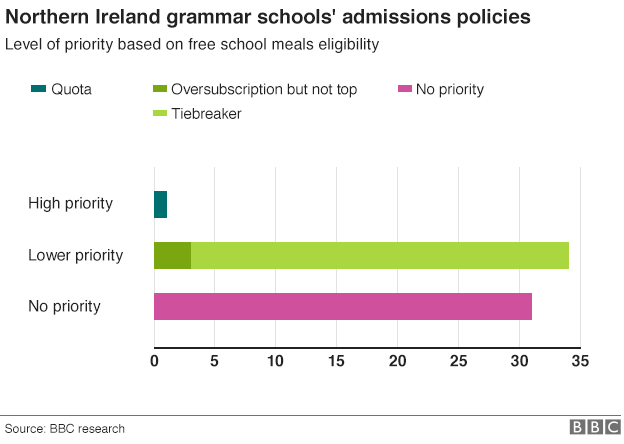

Mapping poverty
Grammar schools are more likely to be located in wealthier areas, but there appears to be no obvious link between their admission policies and how close they are to more deprived areas.
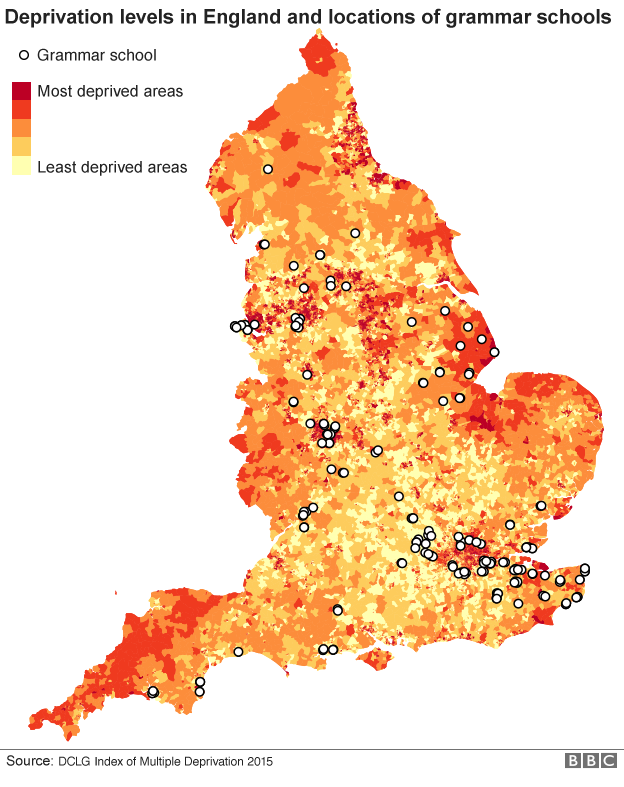
Grammar schools are currently found in 36 of England's 152 local authority areas
Areas in detail
Looking at deprivation levels within a 5km (three-mile) distance of a grammar school can reveal how closely the school matches its locality.
Handsworth Grammar School, in Birmingham, is in one of the most deprived areas in the country, and its intake reflects that: even without a quota, 27% of its pupils have been eligible for free school meals within the past six years, close to the England average of 29.4%
The King Edward VI Foundation Schools, in Birmingham, has introduced the most ambitious quota systems, allocating up to 25% of places for children from lower income families.
Wolverhampton Girls' High School gives no priority to children who have been entitled to free school meals, although it sits between affluent and more deprived areas.
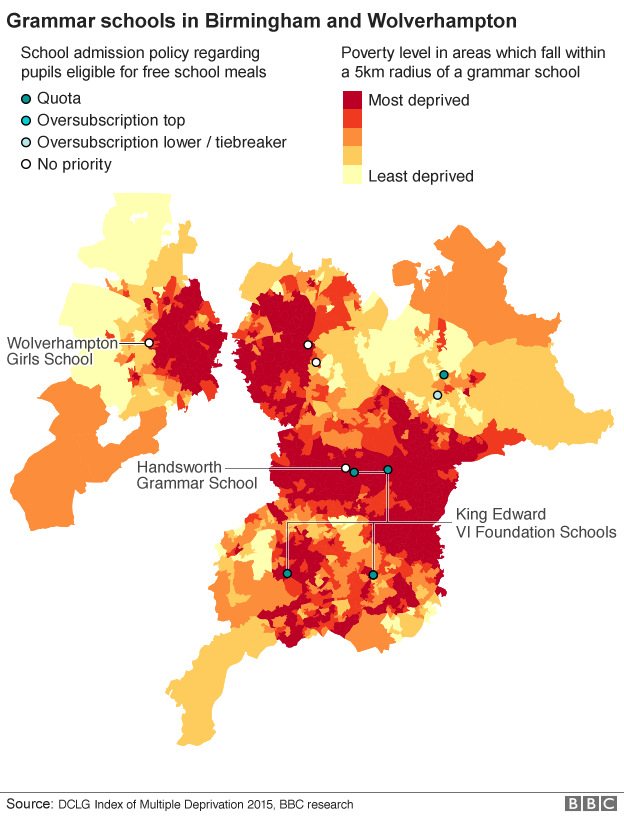
The five King Edward VI Foundation schools (two share a site) in Birmingham apply quotas in admissions
In Reading, both the boys' and girls' grammar schools give high priority to children who have received free school meals in the past six years and live within the catchment area.
The designated areas for the schools are wide, covering postcodes that include more deprived parts of the town but the proportion of their pupils entitled to free school meals in the past six years is tiny compared with the local authority average.
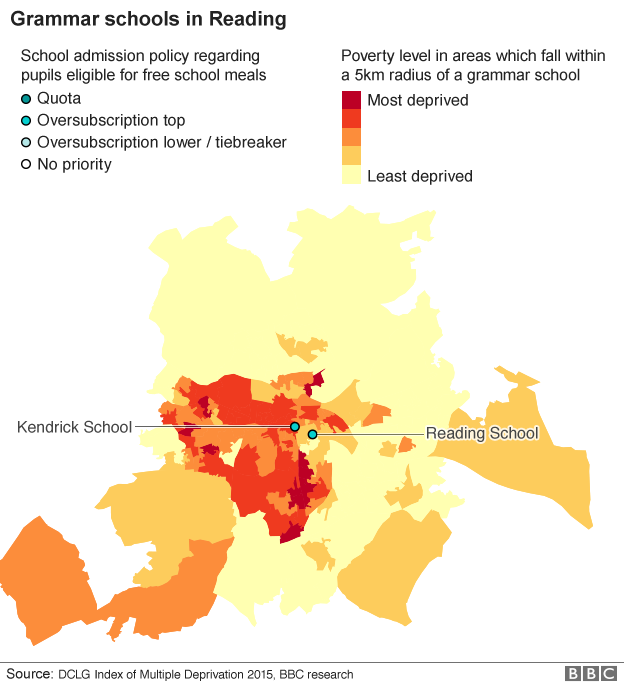
In Reading, both the grammar schools give high priority to children who have received free school meals in the past six years and live within the catchment area
Grammar school pupils travel further than children going to a non-selective school.
So the boys' grammar school in Tunbridge Wells has altered its admission policy to give priority to pupils from low income families who also live close to the school.
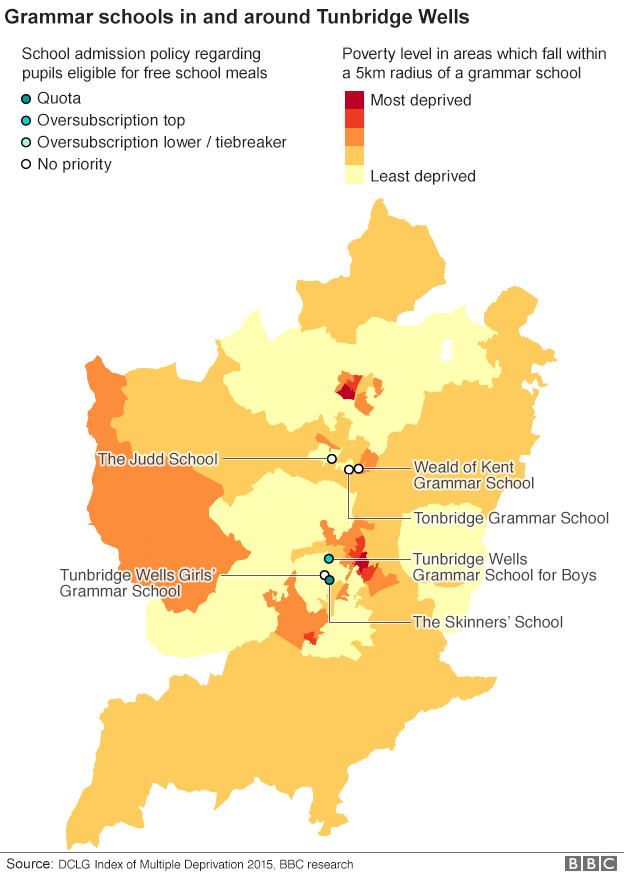
Tunbridge Wells Grammar School for boys has altered its admission policy to give priority to pupils from low income families who also live close to the school.

Why focus on free school meals?
In England, the Department for Education gathers data not only on whether pupils are currently taking free school meals but on whether they have been eligible at any point in the past six years - a so-called "Ever 6" measure.
This is seen as a robust way of measuring poverty as it covers families where, for example, a parent is in and out of employment. Schools receive a "pupil premium" of extra funding for each Ever 6 child.
Across all state secondary schools in England, an average of 29.4% of pupils are or have been eligible for free meals under the Ever 6 criteria, according to latest figures.
But the proportion varies widely across of the country, with impoverished Tower Hamlets in London seeing 70.5% of its secondary school pupils needing free school meals in the past six years but only 14.7% in Buckinghamshire.

Across all state secondary schools in England, an average of 29.4% of pupils are or have been eligible for free meals
In grammar schools, our analysis shows that the Ever 6 average is much lower, at 6.9% of pupils.
Handsworth Grammar School, in Birmingham, has the highest proportion, at 27%, although this is still below the England average and well below the city's figure of 49%.
At the other end of the scale, is Beaconsfield High School, where just 0.8% of the pupils were eligible at any point between 2009-15.

The proportion of pupils who have been eligible free school meals within six years varies widely across grammar schools

By Branwen Jeffreys, Christine Jeavans, Ed Lowther, Katherine Smith, Mark Bryson, Rachel Schraer, Zoe Bartholomew
- Published18 October 2016
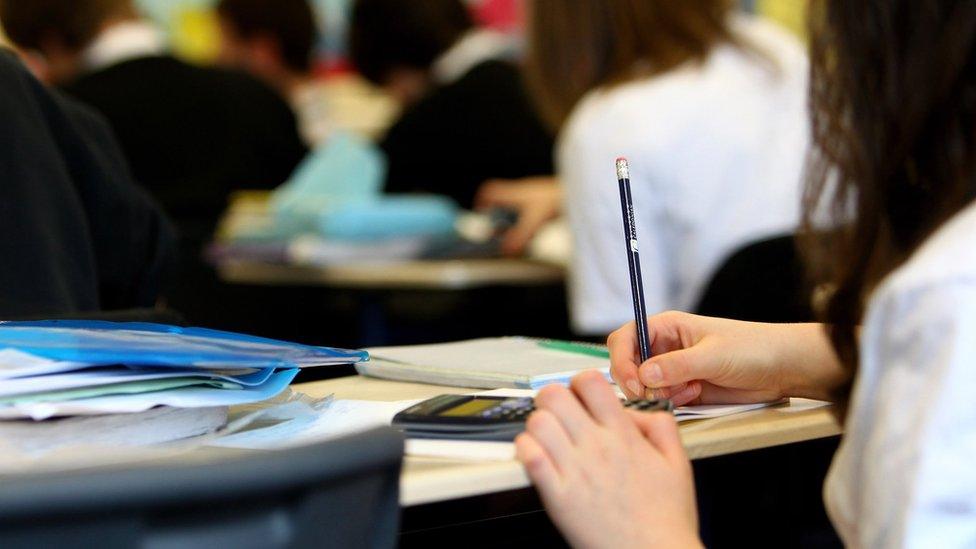
- Published9 September 2016
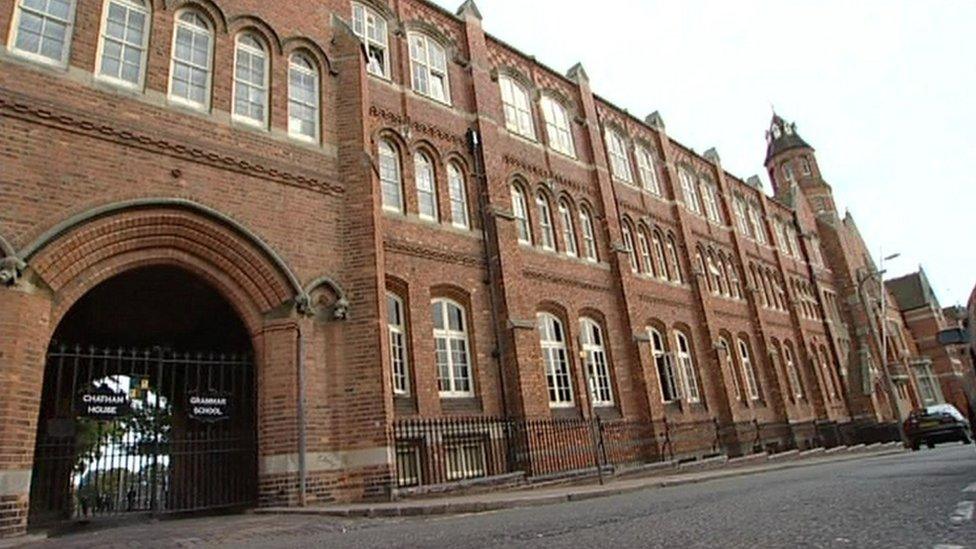
- Published5 September 2016
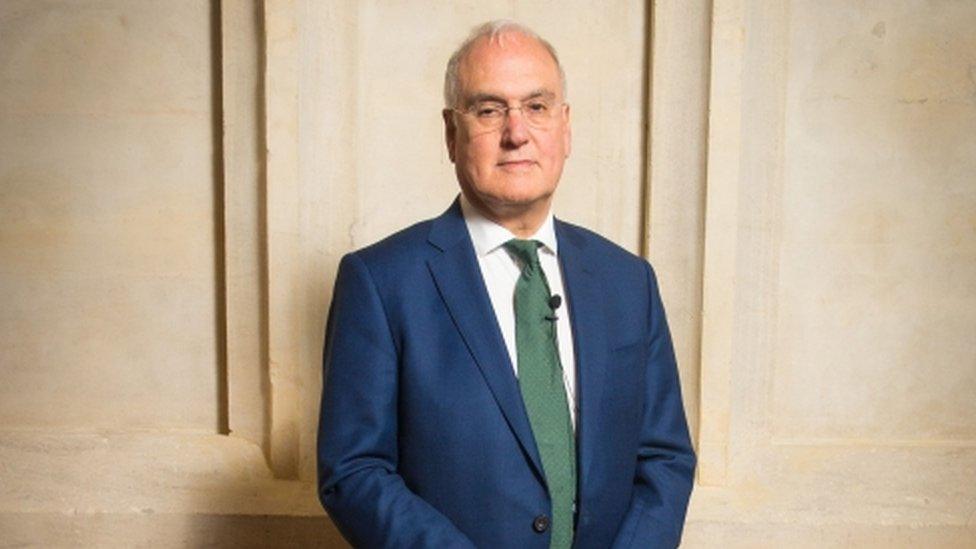
- Published15 September 2016
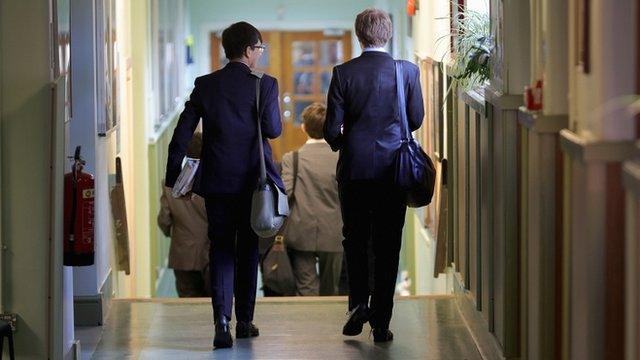
- Published9 September 2016
